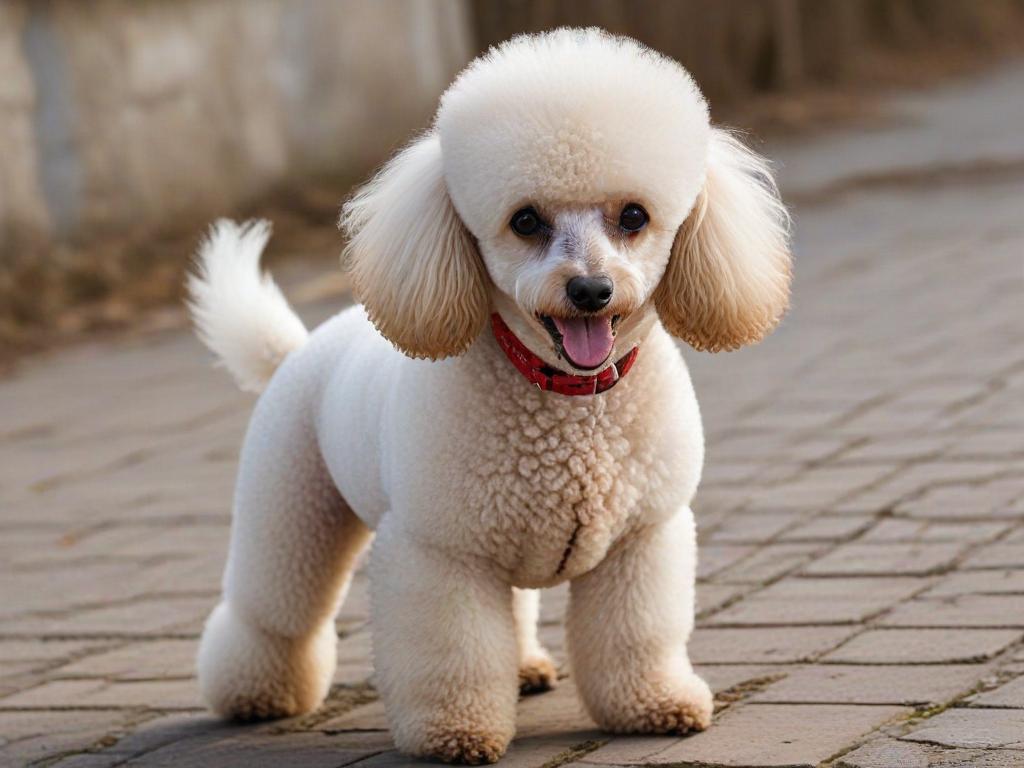
The Poodle, known for its elegant appearance and high intelligence, is a beloved breed worldwide. This article will explore the characteristics, origin, lifestyle, personality, lifespan, interesting facts, grooming needs, food habits, and care guidelines for the Poodle.
Characteristics
Poodles come in three sizes: Standard, Miniature, and Toy. Despite their size differences, all Poodles share a distinctive curly or corded coat, which can be various colors, including white, black, apricot, and gray. Standard Poodles are over 15 inches tall at the shoulder and weigh 40-70 pounds, Miniature Poodles are 10-15 inches tall and weigh 10-15 pounds, while Toy Poodles are under 10 inches tall and weigh 4-6 pounds. Poodles are known for their graceful, athletic build and expressive faces.
Origin
The Poodle’s origin can be traced back to Germany, where they were initially bred as water retrievers. The breed’s name comes from the German word “Pudel,” meaning to splash in water. Despite their German origins, Poodles became particularly popular in France, where they were bred for hunting and later became favored by nobility. The Poodle is now France’s national dog.
Lifestyle
Poodles are highly adaptable and thrive in various living environments, from apartments to large homes with yards. They require regular exercise to keep their minds and bodies active. Daily walks, playtime, and mental stimulation through training or interactive toys are essential for their well-being. Poodles are known for their agility and enjoy activities such as swimming, retrieving, and participating in dog sports.
Personality
Poodles are highly intelligent, alert, and eager to please, making them one of the most trainable dog breeds. They are known for their friendly and sociable nature, getting along well with children and other pets. Poodles can be reserved with strangers but are generally affectionate and loyal to their families. Their intelligence and keen sense of humor often make them the center of attention.
Lifespan
Poodles have a relatively long lifespan compared to other breeds. Standard Poodles typically live 12-15 years, Miniature Poodles live 14-16 years, and Toy Poodles can live 14-18 years. Proper care, nutrition, and regular veterinary check-ups can help ensure a long and healthy life.
Interesting Facts
1. Versatile Performers: Poodles are often seen in circuses and performance shows due to their intelligence and trainability.
2. Hypoallergenic: Poodles have a low-shedding coat, making them a popular choice for people with allergies.
3. Historical Companions: Poodles have been favored by many historical figures, including King Louis XVI and Winston Churchill.
Grooming
Poodles have high grooming needs due to their curly or corded coats, which require regular brushing to prevent matting. Many Poodle owners choose to have their dogs professionally groomed every 4-6 weeks to maintain their coat and prevent skin issues. Regular ear cleaning, nail trimming, and dental care are also essential parts of Poodle grooming.
Food Habits and Preferences
Poodles should be fed a balanced diet appropriate for their age, size, and activity level. High-quality commercial dog food is typically sufficient, but some owners may choose to supplement with fresh vegetables, lean meats, and grains. Poodles can be prone to obesity, so portion control and regular exercise are crucial. Fresh water should always be available.
Guidelines for Care
1. Exercise: Ensure your Poodle gets regular physical activity through daily walks, playtime, and mental stimulation. Activities like swimming and agility training are particularly beneficial.
2. Training: Use positive reinforcement techniques for training. Poodles are highly intelligent and respond well to consistent, reward-based training methods.
3. Socialization: Expose your Poodle to various environments, people, and other animals from a young age to promote good behavior and reduce anxiety.
4. Health Check-ups: Regular veterinary visits are essential to monitor their health, keep up with vaccinations, and prevent common health issues such as hip dysplasia and eye disorders.
5. Grooming: Regular grooming is vital to keep your Poodle’s coat healthy and prevent matting. Brush their coat frequently and consider professional grooming every few weeks.
6. Diet: Provide a balanced diet with appropriate portions to prevent obesity. Monitor their weight and adjust their diet as needed.
In conclusion, Poodles are intelligent, affectionate, and versatile companions with unique characteristics and needs. With proper care, training, and attention, they can bring joy and companionship to any household, making them a cherished breed among dog lovers.
